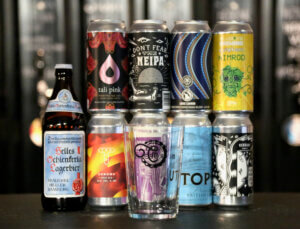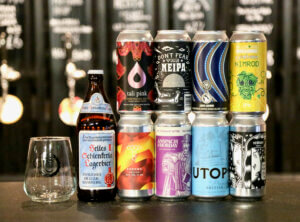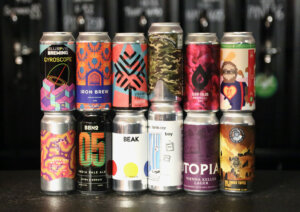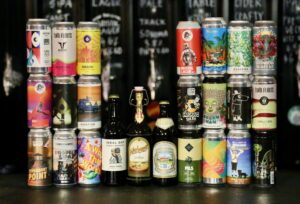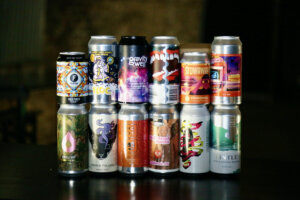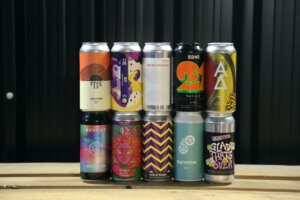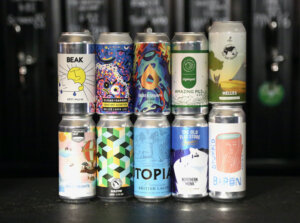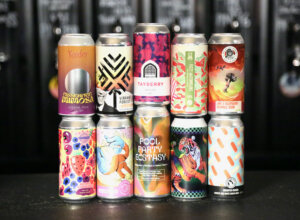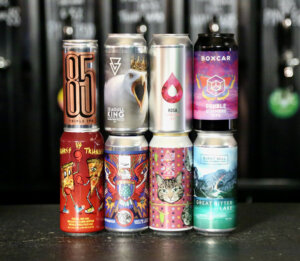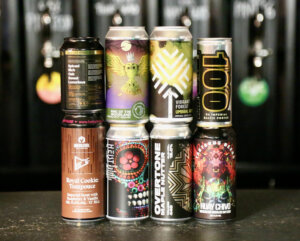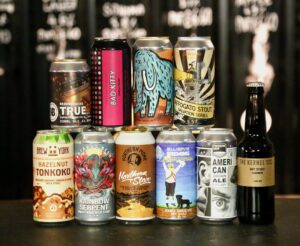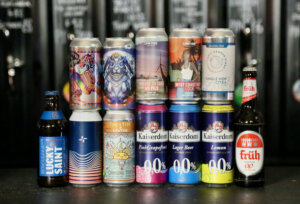Posted on 10/09/24
Like most people I love a beer but what’s it actually like to make the stuff, and how hard is it, especially in the current climate? I sat down with relative newbies, Drop Project, to find out what modern challenges there are in making craft beer in 2024.
Why start a brewery in such a competitive and somewhat crowded market?
With a lot of heart and soul, but ultimately beer is about bringing people together and enjoying friendship in a social environment. Craft beer is about doing this in the best possible way and showcasing your skills and creativity in what was for years a boring one dimensional flavourless space. Primarily, having worked in the industry for years, the time had come to be our own bosses and do our own thing. It was also a chance to build a brand and product inspired by the things we love out side of work, in our case a love for the great outdoors and board sports. Finally, we were not afraid of a challenge in a crowded market space. We wanted to still stand out and showcase our skillsets, demonstrating how far we had come as professionals.
To make matters tricky for you there was a pandemic 6 months after you launched. Looking back has that changed and shaped what you are now or would you always have arrived here?
Absolutely 100%. Pandemic aside, we have had several other, and in some cases, far more difficult challenges. For example, Brexit and the collapse of our export market, soaring energy bills, soaring material bills, material shortages and a complete overhaul of the beer duty system. In some instances we have seen price increases of 400%. For a small business these challenges have been incredibly hard to navigate and push through. But we have learned allot from it and given the market conditions, we are very proud to be where we are today. I wouldn’t recommend the stress levels to anyone but in terms of a learning curve and professional development, this has pushed us to be more nimble, efficient and flexible as a business. I think we have developed an appreciation and greater sense of empathy for our business, each other and our industry too. This hasn’t been easy, it isn’t easy even in the best of times. You can do a lot right and it still might not go your way. Despite all this, we are still here and now we are out the other side it feels like a privilege to be serving the industry still. But to answer your question, I think we would have always arrived here, but I think we feel we arrived here a few years behind schedule given the last few years!
We hear a lot about how it’s a tricky world out there especially for breweries, let alone newish ones, is it really that hard?
I think its certainly not easy in the current market and it’s definitely not easy given the lack of support for the beer industry and hospitality as a whole. I read articles like these and the brewery owners are quite jaded and talking down the industry, yes it’s difficult, but it can still be rewarding and an incredibly vibrant space to operate in. If we all pack it in we’ve handed our industry back over to the big guys. They will continue to bully us out of the market space anyway they can, I say what would be the point of it all then. My hope for newish breweries is that the market forces innovation, efficiency and ultimately better and more robust businesses. But all that said, we can’t go it alone, it has become unnecessarily hard, we pay one of the highest beer duties in Europe. The entire sector could use a break and encouragement, hopefully our legislators are reading and taking note. The Small Brewers Duty Relief helped start an entirely new industry and craft beer revolution in this country, imagine what we could grow with similar incentives.
How different is craft brewing and craft beer in 2024, not just in terms of finances and running a brewery but brewing too?
Creatively, brewing in an incredibly good place, the economic doom and gloom aside we are boasting one the best standards for craft beer in the world with an incredible mix of innovation, exciting new styles and centuries of traditions. It’s been one of the things we have really excelled at on the world stage. Unlike some of the European breweries, we don’t allow tradition to stifle our creativity and in the same breath, cask sales of real ale for us have never been higher. I think its some thing the industry here owes itself a pat on the back for. The beautiful thing about beer is its always changing, be it seasonal changes to raw materials, hops, barley etc. But in terms of new ingredients, materials and engineering solutions hitting the industry, we have never had so much available to us to play with. It has been an art form for centuries and it is rapidly developing as a science, that in itself is a pleasure to watch and be part of. I feel we are in a lot of ways just scratching the surface of beer, we’ve come such a long way in single decade here alone.
Are the challenges of starting a brewery and maintaining one different to 10 years ago?
In short the basic fundamental challenges are the same, but it’s not enough to turn up and give it a go. You need to be the full package. You need an efficient business model, a great marketing team, a quality set up, a professional experienced staff, an incredible suite of products to back it all up and an innovative mindset. Ultimately, you still need a passion to do this type of business that bit has remained the same and that’s the part that makes the industry so special!
How has the brewing scene changed since the pandemic?
I think its definitely been through the mill recently but it has matured incredibly over the past decade, not just the past five years. All the challenges aside, we are seeing allot of grass routes development form breweries themselves. Craft beer festivals are no longer driven by large events companies the breweries are doing them for themselves and supporting each other. From a business perspective, the industry is a lot more grown-up and sure of itself, breweries are being viewed from a lens of a business owner vs a brewer. I think there are many great brewers who were terrible business folk but they are now recognising the importance of that side if things more and more. As for the behind the closed doors scene, the breweries are definitely less party hard and more professionally focused, I think its grown up across the board. That or we just all got old! Ultimately its a tougher more completive space where the average punter or even bar manager can’t distinguish your independent product form say a Heineken owned craft beer like Neck Oil. The only positive upside to this situation is craft beer is no longer for your stereotypical hipster craft beer caricature, lots of non craft beer drinkers are now drinking craft beer. The space has also become allot more inclusive with a huge uptake in female participation. There is also now some incredible beer projects focussed on more traditionally marginalised groups such as the LGBTQ community and even breweries that have strong charitable focus supporting people with physical and mental disabilities. Its not just a bunch of bloated old white men and hipsters debating niche beers. Its now everyone coming together in a more inclusive space with a common love for great beer! Ultimately that’s what’s its always been about for us.
You hear a lot about breweries closing, how do you even start to think about navigating that and what’s key to surviving in this post-pandemic brewing age?
The key to any business is being dynamic and having the relative nous to adapt and overcome the various obstacles that present themselves. With covid then unprecedented supply issues and inflationary pressures that followed, it’s not been easy. We have navigated through it and came out the overside with an established, growing business. We have pivoted from small pack, special beers to be drank at home in covid, to now established core lines focused on-trade business with sales strategy highly geared towards the pub trade – a far reach from 2020/2022. Our strength has always been our quality, we have never wavered from that key ethos and now our product shines as we can now compete on price as we have scaled. We have continually invested in our brand and team, building a business that has incredibly firm foundations.
What next for you guys, where do you want to be in 12 months and 5 years?
We want to be available on more taps around the country with a big focus on larger national accounts. Getting us into the hands of more punters and converting them to craft beer lifestyle. Right now we are going through an expansion to increase capacity, improve engineering and business efficiencies and we are implementing new technologies to off grid our selves and reduce our carbon footprint. I think ultimately we just want to be part of the industry, but stay in the game in a sustainable manner. I think that means not getting to big to quick, focusing on our core beliefs and ever continuing our development of new and exciting beers. Given the last 5 years though, who the hell knows where will be, once were still in the game doing what we love that’s all that matters.
Oli Meade owns and runs Craft Metropolis, a specialist online bottle shop and two taprooms in South London. You can support his business and Drop Project by ordering beer from craftmetropolis.co.uk.
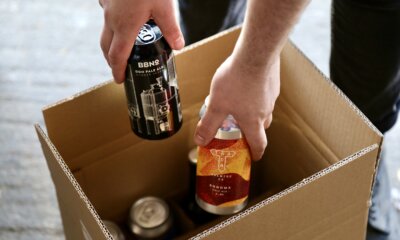 Step 1
Step 1
We trawl the globe tasting great beer


